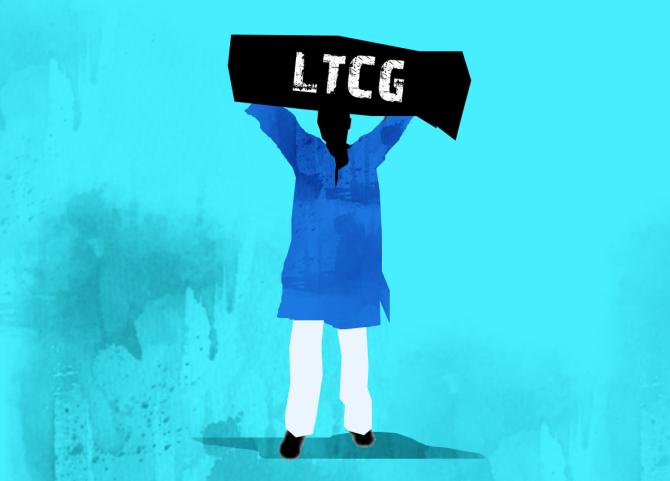‘The original provision will be restored. AMT is meant only for those claiming deductions, not for firms earning regular income like capital gains,’ a senior government official said.

Illustration: Dominic Xavier/Rediff
The government is likely to fix a key omission in the draft Income Tax (I-T) Bill, 2025, which could have widened the scope of alternate minimum tax (AMT) for non-corporate taxpayers such as partnership firms and limited liability partnerships (LLPs) that were earning only long-term capital gains (LTCG), according to a senior official.
The proposed legislation had removed a reference to Chapter VI-A deductions, which serves as a key qualifier for when AMT applies to non-corporate entities.
Without this reference, the draft Bill appeared to imply that such entities would be liable to pay AMT.
AMT, levied at 18.5 per cent plus cess and surcharge for non-corporate taxpayers, is designed to ensure that high-income earners cannot eliminate their tax obligations by availing significant tax breaks.
However, an LLP with only LTCG income pays 12.5 per cent tax.
Following the aforementioned omission in the I-T Bill, LLPs earning only LTCG could have to pay 18.5 per cent AMT, thus significantly increasing their tax burden.
A senior government official, speaking to Business Standard, indicated the omission was inadvertent and that the critical clause would be reinstated when the Bill is reviewed.
“The original provision will be restored. AMT is meant only for those claiming deductions, not for firms earning regular income like capital gains,” the official said.
An email query sent to the ministry of finance remained unanswered at the time of going to press.
According to the ministry of corporate affairs, India had 395,000 active LLPs as of April 30, 2025 — up 19.5 per cent from a year earlier.
Many of these entities, including several family offices, use the LLP structure for investment activities that generate long-term capital gains taxed at the concessional rate of 12.5 per cent, according to experts.
Under the Income-Tax Act, 1961, AMT applies only if LLPs or partnership firms claim specified deductions under Chapter VI-A.
These include donations to registered charities (Section 80G), profits from infrastructure projects (Sections 80-IA to 80-IE), employment generation (80JJAA), and waste management businesses (80JJA).
If, after claiming such deductions, their effective tax liability falls below 18.5 per cent, AMT at that rate kicks in.
“Currently, the way the provision in the new I-T Bill is drafted, it gives an impression that all LLPs will be liable to AMT, instead of only those LLPs which are availing Chapter VI-A deductions and specified benefits. This seems to be a drafting error and unintentional,” said Punit Shah, partner with Dhruva Advisors.
“This provision could adversely impact all LLPs which are earning LTCG income, as LTCG is taxed at a concessional rate. It would be appropriate for the government to amend the relevant provision to address this anomaly.”
Industry bodies have flagged the issue to the Parliamentary Select Committee currently reviewing the proposed legislation.
Based on the current I-T Bill, according to Samir Kanabar, tax partner at EY India, only those non-corporate taxpayers opting for the new income-tax regime (where the taxpayers are not allowed to claim any specified tax deductions) would be insulated from AMT.
“However, AMT could have been triggered for non-corporate taxpayers who aren’t claiming any of the specified deductions,” he added.
Feature Presentation: Aslam Hunani/Rediff




